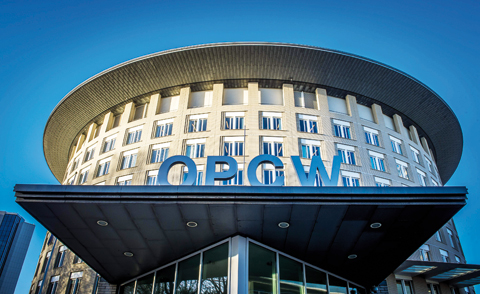 THE HAGUE: This picture shows an exterior view of the Organization for the Prohibition of Chemical Weapons (OPCW) building in The Hague. —AFP
THE HAGUE: This picture shows an exterior view of the Organization for the Prohibition of Chemical Weapons (OPCW) building in The Hague. —AFPTHE HAGUE: In a diplomatic victory for Britain, countries voted by a wide margin yesterday to give the world's chemical weapons watchdog new powers to assign blame for attacks with banned toxic munitions. In a special session, member states of the Organization for the Prohibition of Chemical Weapons (OPCW) voted in favor of a British-led proposal to grant the new powers by a 82-24 margin, easily reaching the two-thirds majority needed for it to succeed.
The motion was supported by the United States and European Union, but opposed by Russia, Iran, Syria and their allies. "The international community has come together to strengthen the ban against chemical weapons use," Britain's foreign office said in a statement immediately following the vote. Though the use of chemical weapons is illegal under international law, the taboo on deploying them has been eroding after their repeated use in the Syrian civil war, but also in Iraq, Malaysia and Britain since 2012.
From 2015 to 2017 a joint United Nations-OPCW team had been appointed to assign blame for chemical attacks in Syria. It found that Syrian government troops used nerve agent sarin and chorine barrel bombs on several occasions, while Islamic State militants were found to have used sulphur mustard. But at a deadlocked UN Security Council, the joint team was disbanded last year after Moscow used its veto to block several resolutions seeking to renew its mandate. The British proposal declares the OPCW will be empowered to attribute blame for attacks, though details of how it will do so will still need to be further defined by the organizations' members.--Reuters










